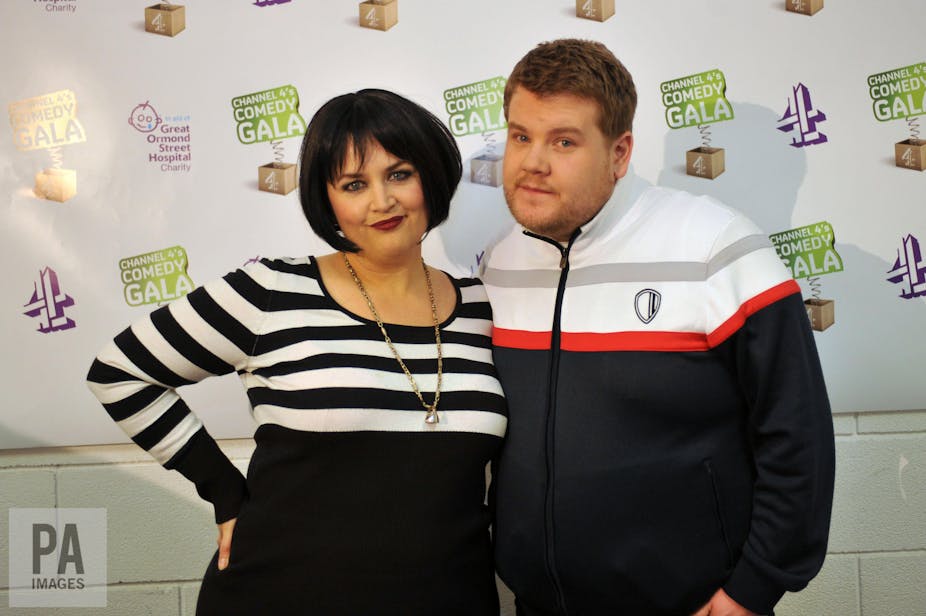Watching the BBC comedy series Gavin & Stacey you learn as much about romance as you do about British cultural and political unity. Before the couple meet in person, they fall in love talking to each other over the phone. From the first episode, you notice they’re separated by both space and a half-language barrier, with local dialect, slang and strong accents playing off one other.
Gavin (played by Matthew Horne) and Stacey’s (Joanna Page) voices are all they have of each other before they consummate their relationship. It is a sitcom with an inbuilt ending – Gavin and Stacey are bound to end up together – the very first episode is about their meeting. But the series is about more than just their love, it is about the bringing together of two very different families, from either side of the Wales/England border.
Unlike other British sitcoms which have dealt with different cultures coming together – Love thy Neighbour put race issues quite literally on the doorstep in the 1970s – Gavin and Stacey’s “commuting relationship” takes characters in and out of their homeland contexts.
Characters are defined by their origin. The humour which arises is down to the fact that each character appears to another character as a stereotype. There are no “jokes” in Gavin & Stacey, unlike other plotted sitcoms, so humour arises in these exchanges between the characters.
The laughter short-cuts regional differences and brings both nations’ audiences together. Without traditional jokes, the funny moments in Gavin & Stacey are when these two opposed worlds, separated by the M4, become one.
The differences between Welsh and English are key to the humour of the show, and still now, ten years on from when the first episode was broadcast, it manages to poke fun at “real” British culture.
All equally stereotypical
Gavin and Stacey, as a couple, act as a catalyst to bring together Anglo and Celtic cultures. The Welsh and English are traditionally historically fierce rivals. Though they are neighbours, both have certain stereotypes of one another: the Welsh are a less intelligent, silly people – while the English are stuck up, with no sense of fun.
In the show, these stereotypes clash with each other in the funniest way. The dry humour of the Welsh, silliness masquerading as seriousness, comes out as the English act as their victims.
Pam: And you must be Uncle Brine … uh, Brian.
Bryn: Bryn.
Pam: Bryn.
Bryn: It means “hill” in Welsh.
Pam: Does it really? Do you know, I’ve no idea what my name means in Welsh. Nessa: Why.
Pam: ‘Cos I don’t speak the lingo, darling.
Nessa: No, in Welsh Pam means “why”.
Pam: Oh.
Nessa: [thinks] Or “brick”.
English politeness is the foil for Welsh mischief. “Welsh humour” becomes translated by the English inability to “get it”. The perfect example is when Gavin is introduced to co-worker Owain Hughes.
Manager: Ah, there is somebody you haven’t met yet, Owain Hughes. Owain heads up the website.
Gavin: Hi, nice to meet you, Gavin Shipman.
Owain: Owain Hughes. And before you ask, no I don’t.
Said with a cheeky look, Owain and the manager laugh at the joke. Gavin, however, has no idea of what the joke “is” – and neither did a lot of the audience.
The absurdity of the Welsh characters only amuses against the straightness of Englishness. Alone, it might not do so well. But it is through our mutual affection for the Welsh characters who provide this absurdity (Uncle Bryn, played by Rob Brydon, and Nessa – played by the show’s co-writer Ruth Jones – especially) that both English and Welsh can laugh at the show.
Before Brexit
In May 2007, long before Brexit and the immigration issues of today, Gavin & Stacey could congratulate itself on exploring one of the last forms of prejudice between the British regions: an ironic regionalism. When character Nessa is disgraced at Smithy’s (James Corden) Englishness, she is accused of racism by Stacey. Nessa corrects her: “It’s xenophobic, Stace”.
This kind of xenophobia is not something all audience members would feel or understand equally. This makes Gavin & Stacey’s humour of mutual prejudice, localised by Barry Island in Wales and Billericay in Essex, so pathetically absurd that far from being politically potent, its impotence says something about how British society felt itself beyond the politics of discrimination.
Gavin & Stacey made such an impression and has lasted so well because it brought two nations together – something which the country could do with in today’s political disarray.

